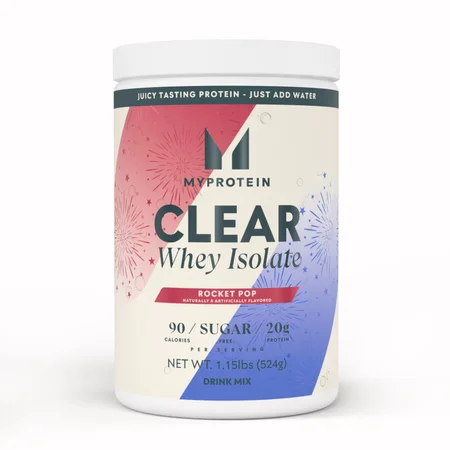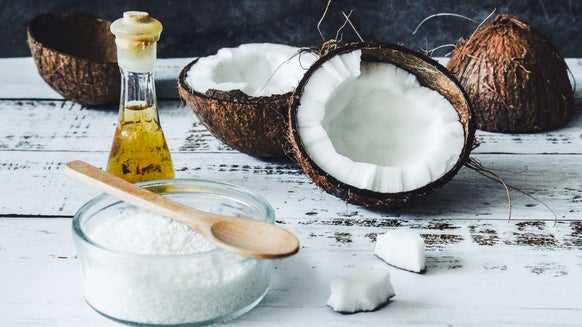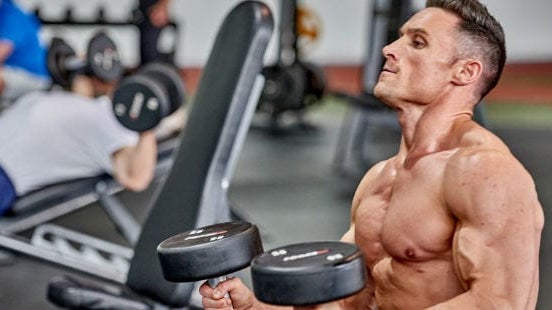What To Eat In A Day To Improve Your Fitness

Have you ever wondered if what you eat can impact your performance? Well, you could be on to something. If you’re wanting to get fitter then your diet may be able to play a bigger role than you first thought.
From powering through tough training sessions to facilitating recovery, let’s find out exactly what you should be eating to get fitter.

How do we get fitter?
When we talk about getting fit, what you’re really aiming to do is improve your cardiovascular fitness. This means you can work for longer, at a higher rate and recover faster.1 Understanding the process of improving your cardiovascular fitness will allow you to focus your efforts in the right place.
Exercise acts as the stimulus for change; nutrition and life outside of training determine how well you’re fueled, how well you recover and how your body adapts.
Exercise provokes widespread changes across many cells, tissues and organs in response to the increased metabolic demand.2 These changes lead to improvements in oxygen delivery, nutrient and waste transport, energy production and more.3 Exercise also promotes adaptations to the cardiovascular system as well.4
When it comes to what kind of exercise you should do, studies show that cardiovascular function can be improved by various forms of aerobic exercise at a range of intensities (from 50 to 95% VO2) and time periods (1–47 months).5
So, how you train can be varied, as can the intensity you train at. Make it fun and something to look forward to and sustain long after lockdown.
Outside of training, promoting optimal sleep and stress management is critically important too.6,7
However, your focus is going to be on how you eat to fuel this activity, recover from it and the supplementation you can use to complement your effort and assist you on your journey to getting fitter.
Fueling our training
To increase your fitness, you have to be able to push yourself in your training. You won’t be able to accomplish this if you're not fueling yourself correctly. So, let’s look at what you can do during the day, before training and during training to really optimize your session.
Fueling yourself during the day
Sure, to upset some people, let’s talk about ideal fuel sources leading up to your training.
Carbohydrate is the body’s primary source of energy during aerobic activity. The Academy of Nutrition and Dietetics (AND), Dietitians of Canada (DC), and the American College of Sports Medicine (ACSM) recommend that you should consume 5 – 7g of carbohydrate per kilogram of bodyweight per day (g/kg/day) for moderate.8 They go on to suggest those engaging in moderate to high intensity exercise (1–3 h/day) should aim to consume 6–10 g/kg/day.
For ultra-endurance athletes (training in the range of 4 – 5 hours of moderate to high intensity exercise a day) it’s recommended they follow a high carbohydrate diet achieving 8 – 12 g/kg/day.9
Whilst you may not wish to follow these recommendations to a tee with your own diet, a predominantly carbohydrate diet would be recommended.
A diet higher in carbohydrate may prevent or reduce glycogen depletion (your internal stores of carbohydrate used to produce energy) as well as provide a readily available source of energy to use in place of glycogen.10 Depleting your glycogen stores can lead to a sense of fatigue, reduced work, and even impaired concentration.11
Before the keto crowd attacks us, yes, it may be a viable option too.12 However, before trialling it, it should be noted that adapting to ketosis is a challenge in of itself and it may actually increase rate of perceived exertion during exercise in some groups.
Pre-workout
When we’re discussing pre-workout in this instance, we’ll be referring to the sixty-minute period leading up to your exercise session because, technically, any time between one workout and another is your pre-workout phase (and that’d be a headache for everyone if we didn’t distinguish it now).
As you get closer to exercise (within 60 minutes) you can start to manipulate your dietary intake to address factors that are typically related to improved recovery and performance:
Glycogen sparing Adequate hydration Reduced protein breakdown Increased muscle protein synthesis (muscle building)
To address these factors, there are three things we need to consider — carbohydrate intake, protein intake and electrolyte or fluid intake.
When it comes to carbs, we want to aim for an easily digestible form — something sugary or starchy is perfect. Easier to breakdown, this carbohydrate will make it to your bloodstream faster and be readily available as an alternative source of energy to your stored carbohydrate.
Try and limit your intake to less than 60g of carbohydrate, however. There’s a rate limiting capacity to absorb more than this in one hour and beyond it could cause a tummy upset (unless you mix multiple carbohydrate forms then you can get away with a bit more). A handful of dried fruit, a banana, or even some sweets are perfect pre-workout carbohydrate options.
A complimentary source of protein can go a long way to help you get the most of your training too. Not only can it reduce protein breakdown during training but can also provide the stimulus (via increased muscle protein synthesis) to optimise your recovery too. A 20-40g serving will work well here. We’d advise aiming on the lower end and matching this with your carbohydrate source. An example would be a banana and protein shake or even something like a flapjack.
Drinking enough fluids and consuming a source of electrolytes is important too. Dehydration can have a significant detrimental effect on exercise performance.13 A simple rule to follow to ensure your hydration status is in tip top shape is to keep a watchful eye on your pee. If it’s pale to straw yellow you’re adequately hydrated.14

During your workout
During training the goal is to continue to provide yourself with readily available carbohydrate if you plan to train for longer than one hour.15 You should also be endearing to keep up your fluid intake during training too to avoid the nasty effects of dehydration. This becomes even more important in the heat.
Sipping on a carbohydrate mix and or bringing along one or more carbohydrate gels would be the best approach (and cause the least amount of disruption with your session).
One addition worth considering would be incorporating branched chain amino acids (BCAAs) into your intra-workout routine. They may be able to delay time to fatigue (even when glycogen depleted) and reduce some of the muscle damage caused by extensive endurance exercise.16,17
Post-workout is critical for exercise adaptation also. We’ve covered this extensively in our previous article centred around improving strength. You could use identical protocols outlined in that article (relating to post-workout) to help increase your fitness.
Supplement considerations
Aside from electrolytes, carbohydrate supplements and on-the-go snacks there are some other supplements you may want to consider to improve your fitness
Caffeine
Caffeine is one of the most robustly studied ergogenic aids and may be of particular benefit for those looking to up their fitness levels.
Caffeine ingestion helps to increase muscular functionality, improve cognitive performance and reduce perceptions of fatigue.18 It can also increase the use of fatty acids for energy as well as increase heat production.
Experts recommend a moderate caffeine dose of 3–6 mg/kg 30–90 min leading up to exercise to maximize the effect.19 For those who are training for greater than this length of time, sipping on caffeine intermittently throughout training also appears to be a great help to endurance performance.20 Combining caffeine and carbohydrate can lead to even more benefit!21
Probiotics
Probiotics are live microorganisms which occur naturally in fermented foods but can also be supplemented. They may help shift the microbiome of our gut to one more favourable to health and performance.
In fact, probiotics have been linked to improved endurance performance.22 They have also been linked to reducing the symptoms of upper respiratory infection in elite athletes, who may be more susceptible to these infections over recreational trainers.23,24
Some endurance athletes also struggle with gastrointestinal issues due to the nature of their sport. Probiotic use may also help reduce the symptoms of these issues too.23
Take home message
How we train, recover and fuel ourselves will all play important roles in our goal of getting fitter.
A diet rich in carbohydrate that also integrates some nutrient timing protocols, supplementation and optimizing hydration state would be one best suited to achieving this goal.
Basically, this whole article is telling you that you should be eating more carbs to get fitter... Call it a late Christmas present!

1. Tomlin, D. L., & Wenger, H. A. (2001). The relationship between aerobic fitness and recovery from high intensity intermittent exercise. Sports Medicine, 31(1), 1-11.
2. Hawley, J. A., Hargreaves, M., Joyner, M. J., & Zierath, J. R. (2014). Integrative biology of exercise. Cell, 159(4), 738-749.
3. Pinckard, K., Baskin, K. K., & Stanford, K. I. (2019). Effects of exercise to improve cardiovascular health. Frontiers in Cardiovascular Medicine, 6, 69.
4. Vega, R. B., Konhilas, J. P., Kelly, D. P., & Leinwand, L. A. (2017). Molecular mechanisms underlying cardiac adaptation to exercise. Cell metabolism, 25(5), 1012-1026.
5. Anderson, L., Oldridge, N., Thompson, D. R., Zwisler, A. D., Rees, K., Martin, N., & Taylor, R. S. (2016). Exercise-based cardiac rehabilitation for coronary heart disease: Cochrane systematic review and meta-analysis. Journal of the American College of Cardiology, 67(1), 1-12.
6. Venter, R. E. (2012). Role of sleep in performance and recovery of athletes: a review article. South African Journal for Research in Sport, Physical Education and Recreation, 34(1), 167-184.
7. Stults-Kolehmainen, M. A., & Sinha, R. (2014). The effects of stress on physical activity and exercise. Sports medicine, 44(1), 81-121.
8. Vitale, K., & Getzin, A. (2019). Nutrition and supplement update for the endurance athlete: Review and recommendations. Nutrients, 11(6), 1289.
9. Thomas, D. T., Erdman, K. A., & Burke, L. M. (2016). Position of the Academy of Nutrition and Dietetics, Dietitians of Canada, and the American College of Sports Medicine: nutrition and athletic performance. Journal of the Academy of Nutrition and Dietetics, 116(3), 501-528.
10. Vitale, K., & Getzin, A. (2019). Nutrition and supplement update for the endurance athlete: Review and recommendations. Nutrients, 11(6), 1289.
11. Getzin, A. R., Milner, C., & Harkins, M. (2017). Fueling the triathlete: evidence-based practical advice for athletes of all levels. Current Sports Medicine Reports, 16(4), 240-246.
12. Bailey, C. P., & Hennessy, E. (2020). A review of the ketogenic diet for endurance athletes: performance enhancer or placebo effect?. Journal of the International Society of Sports Nutrition, 17(1), 1-11.
13. Cheuvront, S. N., & Kenefick, R. W. (2011). Dehydration: physiology, assessment, and performance effects. Comprehensive Physiology, 4(1), 257-285.
14. Goulet, E. D. (2012). Dehydration and endurance performance in competitive athletes. Nutrition Reviews, 70(suppl_2), S132-S136.
15. Vitale, K., & Getzin, A. (2019). Nutrition and supplement update for the endurance athlete: Review and recommendations. Nutrients, 11(6), 1289.
16. Gualano, A. B., Bozza, T., Lopes De Campos, P., Roschel, H., Dos Santos Costa, A., Luiz Marquezi, M., … & Herbert Lancha Junior, A. (2011). Branched-chain amino acids supplementation enhances exercise capacity and lipid oxidation during endurance exercise after muscle glycogen depletion. J Sports Med Phys Fitness, 51(1), 82-8.
17. Kim, D. H., Kim, S. H., Jeong, W. S., & Lee, H. Y. (2013). Effect of BCAA intake during endurance exercises on fatigue substances, muscle damage substances, and energy metabolism substances. Journal of exercise nutrition & biochemistry, 17(4), 169.
18. Vitale, K., & Getzin, A. (2019). Nutrition and supplement update for the endurance athlete: Review and recommendations. Nutrients, 11(6), 1289.
19. Goldstein, E. R., Ziegenfuss, T., Kalman, D., Kreider, R., Campbell, B., Wilborn, C., … & Antonio, J. (2010). International society of sports nutrition position stand: caffeine and performance. Journal of the International Society of Sports Nutrition, 7(1), 1-15.
20. Talanian, J. L., & Spriet, L. L. (2016). Low and moderate doses of caffeine late in exercise improve performance in trained cyclists. Applied Physiology, Nutrition, and Metabolism, 41(8), 850-855.
21. Ivy, J. L., Costill, D., Fink, W., & Lower, R. (1979). Influence of caffeine and carbohydrate feedings on endurance performance. Pulse, 1620(16.18), 1693.
22. Coqueiro, A. Y., de Oliveira Garcia, A. B., Rogero, M. M., & Tirapegui, J. (2017). Probiotic supplementation in sports and physical exercise: Does it present any ergogenic effect?. Nutrition and health, 23(4), 239-249.
23. Leite, G. S., Student, A. S. R. M., West, N. P., & Lancha Jr, A. H. (2019). Probiotics and sports: A new magic bullet?. Nutrition, 60, 152-160.
24. Spence, L., Brown, W. J., Pyne, D. B., Nissen, M. D., Sloots, T. P., McCormack, J. G., … & Fricker, P. A. (2007). Incidence, etiology, and symptomatology of upper respiratory illness in elite athletes. Medicine & Science in Sports & Exercise, 39(4), 577-586.








